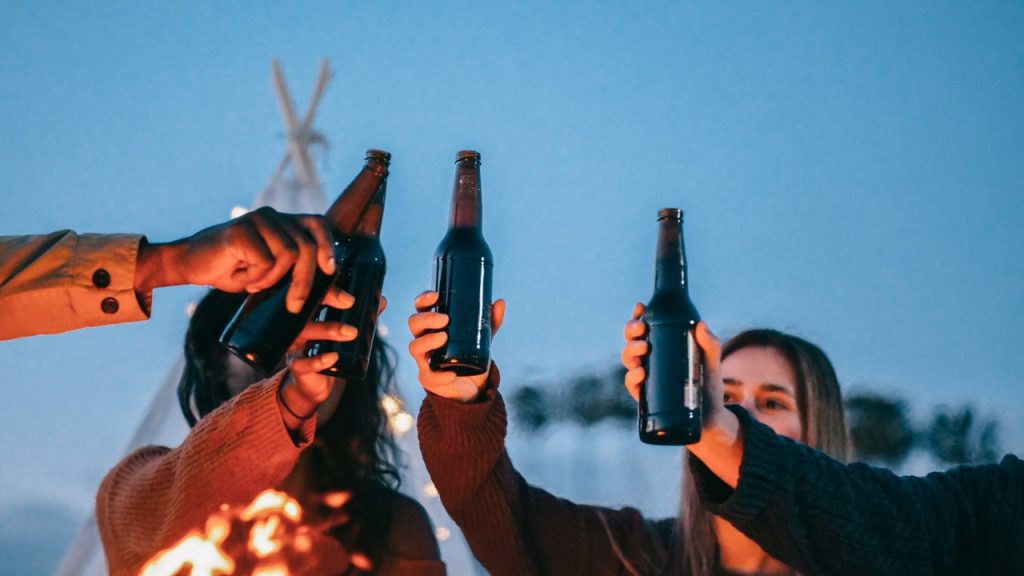How To Cope With Social Anxiety Without Alcohol
Most of us have used alcohol to relax in a social situation at one time or another. And for many people, ordering a beer at the bar is one of the first things they do at a social event.
In moderation, social drinking is generally nothing to worry about. But for people with social anxiety, things can get a bit more complicated.
It turns out that social anxiety and alcohol misuse have a close relationship. In fact, up to 20 percent of people with social anxiety disorder also struggle with alcohol use disorder (AUD). Many more fall into a gray area, and would like to drink less than they do on social occasions.
If this sounds like you, rest assured that you’re in good company. Below, we’ll look into why people with social anxiety might drink more, and offer some tips for coping without alcohol.
What Is Social Anxiety Disorder?
Social anxiety disorder (SAD) is a mental health condition that causes excessive fear in social settings. Living with this condition means you might feel a spike in anxiety when making phone calls, talking to strangers, or even making eye contact with people on the street.
Everybody feels some level of anxiety—at least sometimes. But when you have social anxiety, it goes far beyond what is normal. Aside from the emotional stress, it can also come with physical symptoms like shaking, sweating, and a racing heart. And for many people with SAD, it might feel easier to avoid talking to others entirely.
While SAD can be a struggle, the good news is that there are steps you can take to start feeling better. Some common action plans for managing social anxiety include prescription medication and talk therapy. And of these options, a type of therapy called cognitive behavioral therapy (CBT) has been shown to be an especially helpful tool.
Why Do People Drink To Deal With Social Anxiety?
As with other forms of anxiety, many people find that drinking alcohol helps take the edge off, and allows them to unwind a bit. Since alcohol is often present at social events to begin with, it’s also easy to get into the habit of seeking out some “liquid courage” when you first arrive—especially if you feel uncomfortable in social situations.
Research supports a strong link between social stress and drinking—particularly among college-aged women. However, researchers have also called into question whether alcohol really helps stress, or if it actually makes things worse.
The Link Between Alcohol and Anxiety

Have you ever used alcohol to cope with a stressful day, only for the anxiety to come back in full force once you sobered up? Although a few drinks might seem like a good way to calm your nerves, drinking too much (or too often) can actually have the opposite effect.
In fact, heavy alcohol use and anxiety seem to have a “chicken and egg” relationship. To put it another way, anxiety can lead to drinking, but drinking can also lead to anxiety. This effect usually occurs a few hours to a day after drinking, and is more casually known as hangxiety.
In addition, alcohol and stress—aka the body’s response to threats—also have a two-way relationship. Heavy drinking over a long period can affect your brain chemistry and increase levels of cortisol, your body’s chief stress hormone. And over time, these effects can lead to you feeling less resilient to everyday stress.
Does Alcohol Really Help Social Anxiety?
So, now you know that drinking can have a complex effect on stress as a whole. But what are the effects of using alcohol for social anxiety in particular?
Drinking can help soothe your nerves in the moment, which is the main reason it’s so popular at social events. But in the long run, mixing social anxiety and alcohol can end up doing more harm than good.
For example, social anxiety and alcoholism can interact with each other, and often go hand-in-hand. One study estimates that about 1 in 5 people with SAD also struggle with alcohol abuse or dependence. This may be due to the fact that drinking to cope with anxiety can quickly become a habit—especially since alcohol can worsen your symptoms over time. And before you know it, it could spiral into physical and mental dependence.
Overall, using alcohol for social anxiety can lead to a harmful cycle of ups and downs. And ultimately, it may prevent you from getting the help you need to truly treat your SAD symptoms.
6 Tips for Dealing With Social Anxiety Without Alcohol
Each person will find that different strategies work best for them. However, overcoming social anxiety generally involves a combination of education and exposure. This means working to understand what triggers your anxiety, developing awareness around it, and then gradually exposing yourself to situations that frighten you to become more accustomed to them.
Here are some tips to help you work through this process:
1. Practice Positive Self-Talk
Often, social anxiety is linked to negative expectations about an event, or a negative assessment of one’s coping skills. Try writing down some phrases that you find encouraging, such as, “I am capable and I can do this,” or, “I am valuable no matter what others think of me,” and repeat these to yourself when you’re feeling anxious. Over time, persistent positive self-talk can help you adjust your mindset.
2. Find Some Relaxation Techniques
We know—this is a lot easier said than done in the moment. But learning some strategies to relax ahead of time can help you anchor yourself in social situations. Try techniques such as progressive muscle relaxation (PMR), counting breaths, or deep breathing. This can help relieve tension when surrounded by people you might not know very well, or have just met.
3. Develop a Mindfulness Practice
Along with learning relaxation techniques, a regular mindfulness practice can make it easier to redirect your thoughts in stressful situations. Whether it’s meditating every day for a few minutes, taking a yoga class, or making use of a mindfulness app, there are many ways to incorporate this practice into your daily life and reap the benefits.
4. Take a Break From Events Involving Alcohol

If you’re trying to break the habit of drinking to deal with social anxiety, it can also help to simply take a break from places and situations that involve alcohol. Consider joining meetup groups related to your interests, or taking up a hobby that connects you with others. You may even find that bonding with people who share common interests without alcohol makes it easier to overcome your social anxiety.
5. Look For Some Support
Some people with social anxiety benefit from seeing a therapist or counselor. There are also a number of self-help books, audio programs, and apps that can help you learn new habits or overcome social anxiety. Finding a support system can give you some structure, help you identify which situations challenge you most, and break things down into achievable steps.
How To Know When Your Social Drinking Is a Problem
If you regularly depend on alcohol to calm your nerves, how can you know if it’s becoming a problem? As a first step, it can help to reflect on your own feelings about your social drinking. Consuming more alcohol than you’d like to, or feeling guilty or embarrassed about your use, can be a sign that it’s time for a change.
In addition, drinking before, during, and after social events can also indicate an unhealthy relationship with alcohol. Over time, you might start to feel like you can’t fathom the idea of hanging out with others without it. And you might feel even more anxious in settings where you’re not allowed to drink—such as work or other daytime activities.
Thankfully, there is help available if you’ve been struggling with alcohol use and social anxiety disorder. To connect with others who may relate to your struggles, you can try groups like AA, SMART Recovery, or other secular options. And if you need more comprehensive help, many in-person and outpatient treatment programs specialize in treating co-occurring disorders.
Finally, telemedicine programs like Ria Health can also help you make positive changes in your drinking habits. With Ria Health, you can connect with coaches who have experience helping others with social drinking issues. Plus, you can gain access to anti-craving prescriptions, online support groups, and more to help you reach your goals.
Learn more about how it works today.
Will insurance cover treatment? Verify Coverage
Have Questions? Call (800) 504-5360



